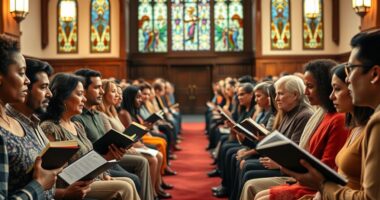To rebuild trust in your community, start by acknowledging past mistakes and demonstrating genuine accountability. Foster open dialogue through transparent communication about church operations and finances. Engage actively with your members and community, listening sincerely to their concerns. Show consistent actions that reflect your commitments and create safe spaces for honest conversations. Remember, rebuilding trust takes time, patience, and unwavering honesty — keep exploring ways to strengthen these foundations for lasting reconciliation.
Key Takeaways
- Admit past mistakes openly and demonstrate genuine accountability to rebuild community trust.
- Engage actively with members through outreach and authentic relationship-building efforts.
- Maintain transparency by sharing information regularly and creating open communication channels.
- Ensure leadership takes responsibility, implements concrete actions, and aligns practices with values.
- Foster open dialogue, listen actively, and practice patience to gradually restore trust within the community.

Rebuilding trust in the church begins with acknowledging past mistakes and demonstrating genuine accountability. When you openly confront issues and admit mistakes, you show your community that transparency is a priority. This honesty lays the groundwork for repairing relationships and fostering a renewed sense of trust. One effective way to do this is through community outreach. By actively engaging with your congregation and broader community, you can listen to concerns, understand different perspectives, and demonstrate that you value their experiences. Community outreach isn’t just about hosting events; it’s about building authentic relationships and showing that the church cares beyond Sunday services.
Rebuilding trust starts with transparency, accountability, and genuine community engagement beyond Sunday services.
Alongside outreach efforts, implementing transparency initiatives is essential. These initiatives involve sharing information openly about church operations, decision-making processes, and financial matters. When you communicate clearly and regularly, you reduce suspicion and build confidence. Transparency initiatives can include publishing reports, holding open forums, or creating channels where members can ask questions directly. When members see that the church is committed to honesty and openness, their trust begins to rebuild, and they become more engaged in the church’s mission.
It’s also important to hold leadership accountable. When mistakes occur, leaders should take responsibility and show that they are committed to learning from those errors. This might mean restructuring certain practices or policies to prevent future issues. Demonstrating accountability reassures your community that the church is serious about growth and integrity. People want to see concrete actions, not just words. When leaders show humility and a willingness to improve, it sends a powerful message that the church values trust and is committed to change.
Additionally, fostering open dialogue within your community helps reinforce these efforts. Create safe spaces where members feel comfortable sharing their concerns without fear of judgment or retaliation. Listening actively to their feedback and acting on it shows that you genuinely care about their well-being and opinions. Over time, consistent actions aligned with transparency and community outreach will help mend broken trust and establish a healthier, more resilient church community.
Rebuilding trust isn’t an overnight process, but with sincere effort, you can restore confidence in your church. Prioritize honest communication, community engagement, and accountability. Be patient, persistent, and open to feedback. When you demonstrate that the church is committed to genuine change and values its members’ trust, you set the stage for a stronger, more unified community rooted in shared faith and respect. Recognizing the importance of color accuracy in visual communication can further enhance how your message is perceived and trusted by your community.
Frequently Asked Questions
How Can Individual Members Foster Trust Within Their Community?
You can foster trust within your community by practicing open faith communication, sharing your thoughts honestly, and listening actively to others. Engage in community activities, show genuine care, and follow through on commitments. Your consistent presence and transparency build credibility, encouraging others to participate and trust. By demonstrating humility and kindness, you help create a supportive environment where faith and community engagement strengthen bonds and renew trust among members.
What Role Does Transparency Play in Rebuilding Church Trust?
Transparency acts as the compass guiding your community through stormy waters, fostering trust like a clear sky after rain. When you embrace open communication and uphold accountability measures, you build bridges of honesty that reconnect hearts. Your willingness to share openly demonstrates integrity and invites others to do the same, creating a cycle of trust that strengthens the church’s foundation. Keep the light shining brightly, and trust will follow naturally.
How Do Leadership Changes Impact Trust Restoration Efforts?
Leadership changes can substantially impact trust restoration efforts by emphasizing leadership accountability and demonstrating commitment to transparency. When new leaders prioritize program evaluation, you see tangible progress and improvements, reinforcing trust. You feel more confident in the church’s direction when leadership openly addresses past issues, learns from them, and actively works to rebuild credibility. This process shows that accountability and ongoing assessment are essential for restoring trust within your community.
Are There Specific Programs Proven Effective in Trust Rebuilding?
Yes, faith-based outreach programs and community engagement initiatives are proven effective in rebuilding trust. You can participate in or organize local events, workshops, and service projects that foster transparency and genuine connection. These programs demonstrate your commitment to the community’s well-being, helping to restore confidence in the church. Consistently showing up, listening, and acting with integrity are key to strengthening relationships and rebuilding trust over time.
How Long Does It Typically Take to Restore Trust in a Church Community?
Trust takes time, typically months to years, depending on your community’s commitment. You’ll witness faith healing as members see genuine change, and community outreach fosters fresh friendships and faith. Consistent transparency, sincere service, and open conversations are key. As you actively engage in these efforts, patience grows, and trust gradually restores—transforming skepticism into steadfast support through persistent prayer, participation, and promise-keeping.
Conclusion
Rebuilding trust in your church isn’t just a small task—it’s the most essential mission you’ll ever undertake. By showing genuine transparency, practicing sincere empathy, and consistently living out your values, you can turn doubt into unwavering faith. Remember, your efforts have the power to reshape hearts and communities, igniting a hope so bright it could outshine the sun. Stay committed, and watch as trust blossoms like a miracle, transforming your church into a beacon of unwavering faith once more.










